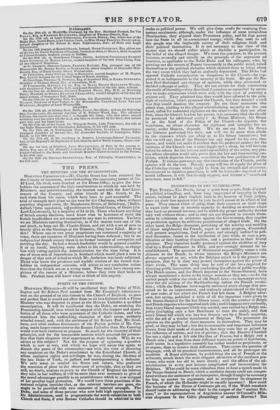PURITY OF THE CHURCH.
MORNING HERALD—It will be recollected that the Duke of Wel- lington and Sir Robert Peel seceded from Mr. Canning's Administra- tion on the ground of an attachment to the Church of England, so pure and perfect that it would not allow them to sit in a Cabinet with a Prime Minister who was disposed to grant to the Roman Catholics a qualified emancipation. It will be recollected that the Duke, on attaining the Premiership himself, into which he stepped with the support and appro. bation of all those who were opponents of the Catholic claims, and who Considered him the unflinching champion of their cause, suddenly wheeled round, and, with the assistance of Sir Robert Peel, Mr. Goal- burn, and other zealous denouncers of the Popish politics of Mr. Can- ning, made larger concessions to the Roman Catholics than Mr. Canning would ever have ventured to propose. So much for the sincerity of their principles, and for the honourable motives which actuated the persecu- tion that their eloquent rival experienced at their bands. Why do we advert to this subject ? Not for the purpose of agitating a question which is now at rest, and which we hope will never rise again to disturb the peace of the community—nor with the view of throwing any suspicion on the Duke's attachment to the Established Church, of whose exclusive rights and privileges he was, during the life-time of the late Duke of York, so gallant and uncompromising a defender. We only mean to remind his Grace and others, who preferred the retention of place to the observance of principle, that as they are still, no doubt, anxious to prove to the Church of England the interest they take in her welfare, it will be more than ever necessary to give all the moral advantages possible to an establishment which is now stripped of her peculiar legal protection. We would have these guardians of the national religion consider that, as the external barriers are gone, she Ought to be provided with new resources of internal strength. The • Duke, and some of those persons who now hold high appointments in .lug Administration, used to prognosticate the worst calamities to both Church and State, if ever Roman Catholics should be admitted in this realm to political power. We still give them credit for retaining Pro.. testanteentiments, although, under the influence of some miraculous illumination, they abjured their Protestant policy, and let that power intO the State in all its unrestricted energy, which they used to tell the people was the implacable enemy of their religious faith and their political institutions. It is not necessary to our view of the matter that we should either admit or disclaim a participation in the belief of the alleged danger. We treat the question, in the present instance, avowedly and strictly on the principle of the argument ad hominem, as applicable to the Noble Duke and his colleagues, who, by pointing out the terrors of Popery incessantly to the public mind, raised themselves to the political elevation which enabled them to bring about the very event which they had so zealously deprecated. The Duke had opposed Catholic emancipation as dangerous to the Church—he sup.. ported it as indispensable to the security of the State. He and Sir Ro- bert Peel disclaimed any change of opinion, while they advocated so decided a change of policy. They did not assume for their concessions the credit of liberality—they described themselves as compelled by neces- sity to make concessions which were evil, with the view of averting a greater evil. They admitted that they would have adhered to the prin- ciple of exclusion, which protected the Church, but they dreaded a civil war that would desolate the country. Do not these statesmen also admit that, yielding to the alleged overwhelming necessity on the one hand, called for redoubled vigilance on the other P—Do they not allow that, since the Church has lost her power, it is necessary that she should be protected by additional purity ? As Prime Minister, his Grace is at the head of the Police of the Church—he appoints the watchmen, on whose character for vigilance and integrity her se- curity, under Heaven, depends. We do not say how his Grace has hitherto performed this duty, nor will we do more than allude to the rumours which are afloat as to his future intentions ; but this we will say, that if the Premier has any regard for his own cha- racter, and would not make it evident that his professed anxiety for the interests of the Church was a mere juggle and a cheat, he will hesitate before he selects for the honour and responsibility of the mitre, any per. son whose elevation would only prove that the low and time-serving am- bition, which degrades the man, constitutes the best qualification of the Prelate. if vicious patronage sap the ibundation of the Church, public opinion will do the rest. Priestly pomp will but ill supply the place of the Christian virtues which ought to form its strength and ornament. Surrendered to faithless guardians, it will be betrayed— deprived of its moral influence, it will lose its only support, and become a "mutilated structure, soon to fall."


























 Previous page
Previous page